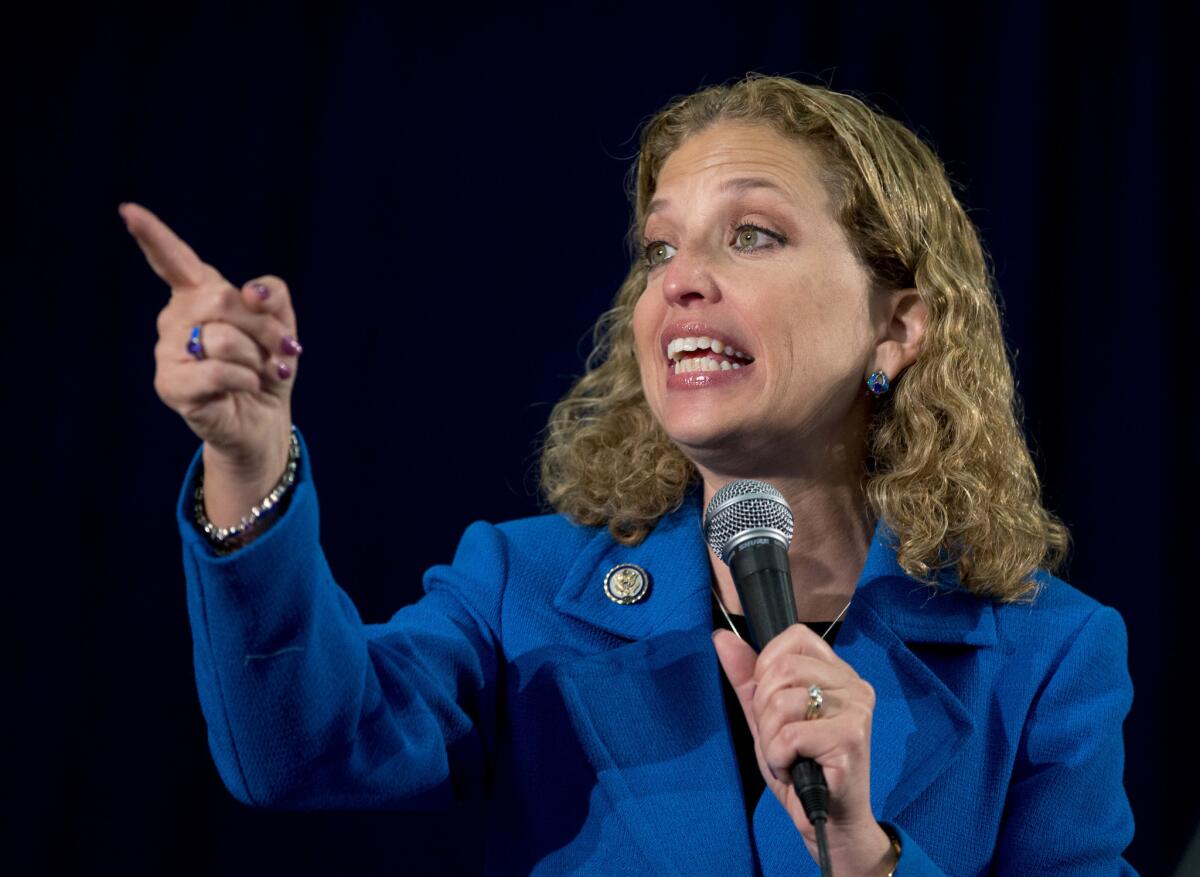Election of new DNC leaders points up tensions with White House

- Share via
WASHINGTON -- After a messy fight that highlighted strains with the White House, the Democratic National Committee completed what should have been the routine election of a new slate of officers Tuesday.
As expected, Rep. Debbie Wasserman Schultz of Florida was given another term as national party chairwoman. But below that level, chaos reigned for a time as DNC members balked at rubber-stamping a White House-approved list of replacements for several veterans of the pre-Obama era.
Among the incoming DNC leaders are vice chairwomen Maria Elena Durazo, a Los Angeles labor official, and Tulsi Gabbard, the newly elected congresswoman from Hawaii. Henry R. Muñoz III of San Antonio was named finance chairman, the first Latino in that post.
Complete coverage of the 2013 inauguration
But many on the DNC strongly resisted the forced removal of longtime activist Alice Travis Germond as DNC secretary. Highly popular with the membership, Germond, who calls the roll of the states at presidential nominating conventions, is only the third person to hold that job since 1944. In order to tighten its control of the DNC, the White House wanted to replace her with Stephanie Rawlings-Blake, the mayor of Baltimore, who has no experience in national politics.
Angered by the handling of the leadership change by Patrick Gaspard, a former Obama organizer who serves as the party’s executive director, DNC members tried to postpone election of the secretary until the fall. A clearly flustered Schultz, after halting the proceedings and huddling offstage with Germond, returned to announce that Germond had agreed to become secretary emeritus of the party and an at-large DNC member. With that, the slate of officers, including Rawlings-Blake, was approved.
The unexpected drama came only days after President Obama announced creation of his new national advocacy operation, Organizing for Action, widely seen as undermining the DNC’s already weakened status as a political organization.
Schultz, who was Obama’s pick as party chairwoman during his first term, defended the president’s decision, telling the DNC that the new Obama group didn’t pose a threat to the national party.
PHOTOS: President Obama’s second inauguration
Schultz said that she was “thrilled” that Obama’s campaign hadn’t ended with the 2012 election and that his new organization would be “complementing the work we are doing.” She said the Obama group would be training and engaging grass-roots volunteers “so that our work at the Democratic Party can continue to be about electing Democrats up and down the ballot.”
The dispute during the meeting at a Washington hotel, one day after Obama’s inaugural celebration, dragged on for so long that Vice President Joe Biden was forced to cool his heels in a nearby ballroom until the DNC members finished their business.
Although the party organization’s influence may be fading, the hundreds of national committee members still retain at least one measure of clout: They are automatic “superdelegates” to the Democrats’ presidential nominating conventions (though Obama aides briefly considered, and then rejected, getting rid of their delegate power several years ago).
Biden, who would covet those DNC delegate votes if he ran for president in 2016, eventually was able to schmooze with the members at a private reception after the meeting.
PHOTOS: Past presidential inaugurations
Follow Politics Now on Twitter and Facebook
Twitter: @paulwestdc
More to Read
Get the L.A. Times Politics newsletter
Deeply reported insights into legislation, politics and policy from Sacramento, Washington and beyond. In your inbox twice per week.
You may occasionally receive promotional content from the Los Angeles Times.










